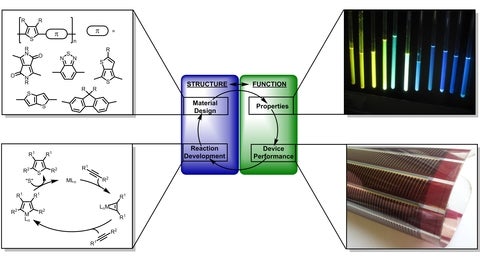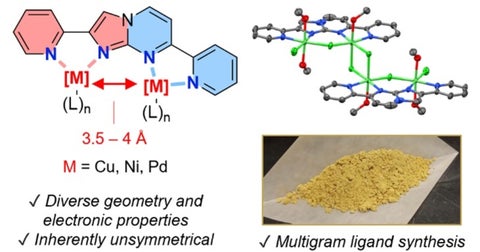
Research
About the Group
Our research is focused on tackling synthetic challenges posed in the context of conjugated organic materials. These materials are poised to make significant technological breakthroughs that will enable the advancement of flexible, lightweight, low-cost electronic devices such as photovoltaics, light emitting diodes and field-effect transistors. The performance of any device depends on the bulk properties of the active material. Improvements of the material properties arise from modification of the material on the molecular level and, therefore, stem from advances in the design and synthesis of new molecular architectures. Our ability to design and construct new materials is limited only by the synthetic tools available to us. Innovative new synthetic capabilities will allow the design of novel molecular architectures and enable the ability to answer fundamental questions about structure/function relationships. Ultimately, this will lead to enhanced properties for these new materials and, therefore, improved device performances.
Our group is also focused on developing a novel class of binucleating ligands centered around the imidazopyrimidine backbone motif. Currently, the synthesis of many bimetallic complexes is limited by the difficult synthesis of the ligand, with many overall ligand syntheses being low yielding, requiring costly reagents, or requiring a significant number of synthetic steps. Additionally, there is a considerable lack of structurally and electronically diverse ligands, with especial emphasis on the lack of unsymmetrical ligands, attributed to the overabundance of symmetrical central motifs such as 1,8-naphthyridine. Bimetallic complexes have become increasingly studied for their catalytic properties and as scaffolds for mechanistic studies into bimetallic catalyzed processes. Within catalysis, these complexes can be capable of unique organic transformations, high selectively, and increased reactivity when compared to analogous monometallic complexes. To increase the widespread use of bimetallic complexes we prioritize the ease of ligand synthesis and scalability of the ligand synthesis, in addition to straightforward bis-ligation to a wide variety of metals.

